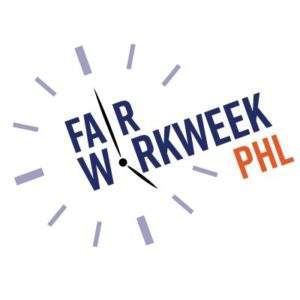 Nearly 100,000 Philadelphians work in the service industry.
Nearly 100,000 Philadelphians work in the service industry.
On top of frequently earning a subminimum wage this is linked with sexual harassment, the majority of these working Philadelphians struggle to find enough hours and with erratic scheduling that makes it difficult to balance work hours and other responsibilities, such as caretaking for children for elderly family members.
According to a recent survey, 83% of Philadelphia’s service workers work less than full-time. Seventy-four percent of those working less than 30 hours would like to work more hours, if they were available.
Sometimes called “on-call scheduling,” unpredictable work schedules also present an unnecessary challenge to economic security. According to the survey, the majority of service workers receive less than two weeks’ notice of their schedule.
What can be done? Enter the Fair Work Week initiative.
San Francisco and Seattle and New York and Oregon State have already passed legislation requiring a certain amount advance notice of work schedules (usually two weeks) and stipulating that workers be compensated by employers when their shifts are changed on shorter notice.
Philadelphia may be next.
On December 6, Philadelphia City Council will vote on the Fair Work Week ordinance.
A new article in CityLab reports the details:
Philadelphia is the poorest big city in the country—it’s maintained a poverty rate of 26 percent for the last five years. To match, its workweek bill is the most expansive to date. All service employees of the largest retail, food, and hotel establishments operating in the city—those that employ more than 250 workers and operate in more than 30 locations worldwide—would be covered by the law, which would take effect in 2020 if passed…
The bill requires eligible employers to start giving their employees a good-faith estimate of their work schedule when they’re hired. That doesn’t have to be a precise weekly schedule, but it must include things like the average number of work hours employees will be scheduled on each week, whether they’ll be needed for on-call shifts, and times they can and cannot be expected to work. Starting in 2020, eligible employers will also have to post detailed work schedules 10 days in advance; that time frame changes to 14 days in 2021. If hours aren’t included in the designated work schedule, employees can decline to work them.
What gives Philly’s bill teeth is that, if employers change the posted work schedule after that 10 or 14 day limit, they’ll also have to pay the employee a “predictability pay” fee, in addition to the employee’s hourly wage for the hours in question.
Click here for information and details regarding the vote in Philadelphia this Thursday. It is open to the public.
We plan to be there and will keep you posted about the vote.
Meanwhile, it’s also important to know getting a Fair Work Week ordinance passed by Philadelphia City Council is not the end of the fight. The Pennsylvania state Legislature has been considering a pre-emption bill designed to nullify and prevent local labor regulation. If House Bill 871 passes into law, it could effectively repeal the Fair Work Week ordinance.
The Women’s Law Project is a public interest law center in Pennsylvania devoted to advancing the rights of women and girls.
Sign up for WLP’s Action Alerts here. Follow us on twitter and like us on Facebook.
We are a non-profit organization. Please consider supporting equal rights for women and girls by making a one-time donation or scheduling a monthly contribution.


